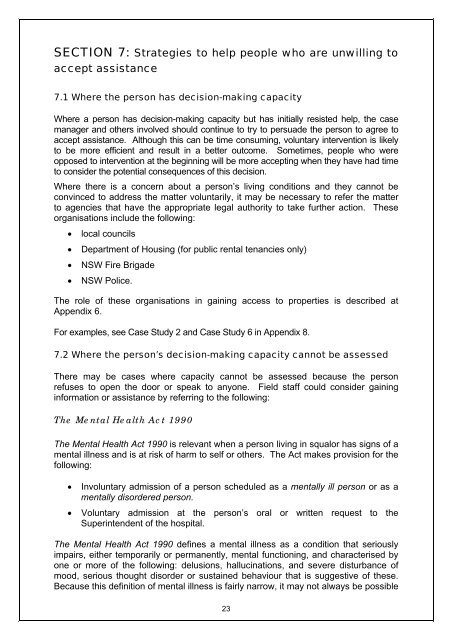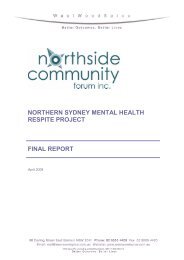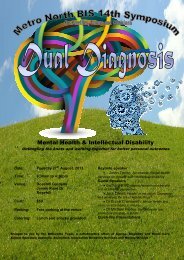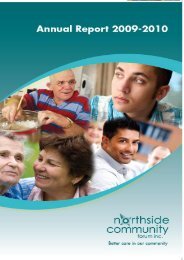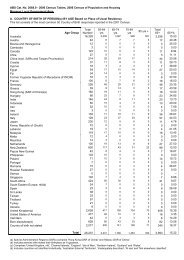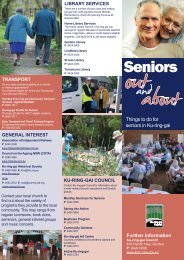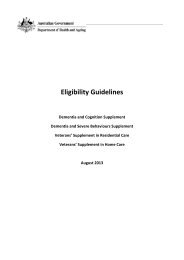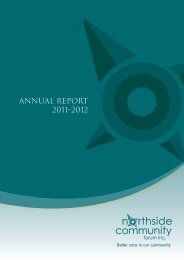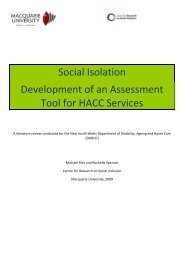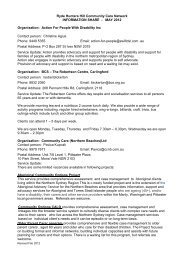Guidelines for field staff to assist people living in ... - Housing NSW
Guidelines for field staff to assist people living in ... - Housing NSW
Guidelines for field staff to assist people living in ... - Housing NSW
Create successful ePaper yourself
Turn your PDF publications into a flip-book with our unique Google optimized e-Paper software.
SECTION 7: Strategies <strong>to</strong> help <strong>people</strong> who are unwill<strong>in</strong>g <strong>to</strong>accept <strong>assist</strong>ance7.1 Where the person has decision-mak<strong>in</strong>g capacityWhere a person has decision-mak<strong>in</strong>g capacity but has <strong>in</strong>itially resisted help, the casemanager and others <strong>in</strong>volved should cont<strong>in</strong>ue <strong>to</strong> try <strong>to</strong> persuade the person <strong>to</strong> agree <strong>to</strong>accept <strong>assist</strong>ance. Although this can be time consum<strong>in</strong>g, voluntary <strong>in</strong>tervention is likely<strong>to</strong> be more efficient and result <strong>in</strong> a better outcome. Sometimes, <strong>people</strong> who wereopposed <strong>to</strong> <strong>in</strong>tervention at the beg<strong>in</strong>n<strong>in</strong>g will be more accept<strong>in</strong>g when they have had time<strong>to</strong> consider the potential consequences of this decision.Where there is a concern about a person’s <strong>liv<strong>in</strong>g</strong> conditions and they cannot beconv<strong>in</strong>ced <strong>to</strong> address the matter voluntarily, it may be necessary <strong>to</strong> refer the matter<strong>to</strong> agencies that have the appropriate legal authority <strong>to</strong> take further action. Theseorganisations <strong>in</strong>clude the follow<strong>in</strong>g:• local councils• Department of Hous<strong>in</strong>g (<strong>for</strong> public rental tenancies only)• <strong>NSW</strong> Fire Brigade• <strong>NSW</strong> Police.The role of these organisations <strong>in</strong> ga<strong>in</strong><strong>in</strong>g access <strong>to</strong> properties is described atAppendix 6.For examples, see Case Study 2 and Case Study 6 <strong>in</strong> Appendix 8.7.2 Where the person’s decision-mak<strong>in</strong>g capacity cannot be assessedThere may be cases where capacity cannot be assessed because the personrefuses <strong>to</strong> open the door or speak <strong>to</strong> anyone. Field <strong>staff</strong> could consider ga<strong>in</strong><strong>in</strong>g<strong>in</strong><strong>for</strong>mation or <strong>assist</strong>ance by referr<strong>in</strong>g <strong>to</strong> the follow<strong>in</strong>g:The Mental Health Act 1990The Mental Health Act 1990 is relevant when a person <strong>liv<strong>in</strong>g</strong> <strong>in</strong> squalor has signs of amental illness and is at risk of harm <strong>to</strong> self or others. The Act makes provision <strong>for</strong> thefollow<strong>in</strong>g:• Involuntary admission of a person scheduled as a mentally ill person or as amentally disordered person.• Voluntary admission at the person’s oral or written request <strong>to</strong> theSuper<strong>in</strong>tendent of the hospital.The Mental Health Act 1990 def<strong>in</strong>es a mental illness as a condition that seriouslyimpairs, either temporarily or permanently, mental function<strong>in</strong>g, and characterised byone or more of the follow<strong>in</strong>g: delusions, halluc<strong>in</strong>ations, and severe disturbance ofmood, serious thought disorder or susta<strong>in</strong>ed behaviour that is suggestive of these.Because this def<strong>in</strong>ition of mental illness is fairly narrow, it may not always be possible23


